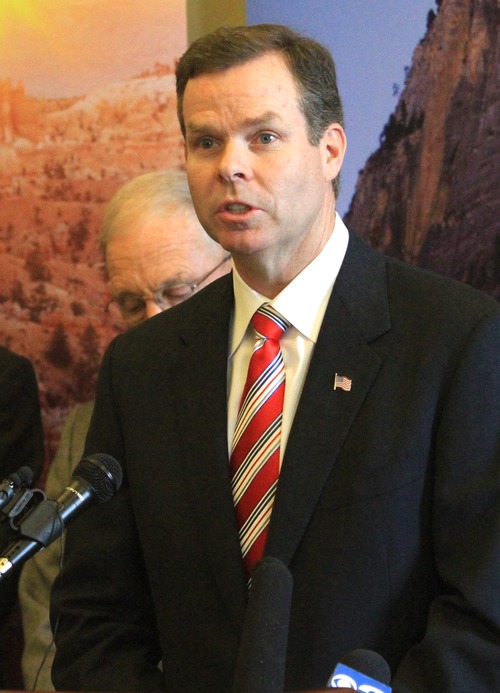This is an archived article that was published on sltrib.com in 2013, and information in the article may be outdated. It is provided only for personal research purposes and may not be reprinted.
The Utah Republican Party broke a nearly two-week silence on allegations of unethical and possibly illegal activities by Utah Attorney General John Swallow, calling on the Legislature to enact new ethics checks on statewide elected officials in the wake of the scandal.
"It's clear that, while some actions might not have been against the law, some, at a minimum, were mistakes for a state employee and a candidate for attorney general," Republican Party Chairman Thomas Wright said Wednesday in a statement.
Wright praised Swallow's calling for an independent investigation of allegations by indicted businessman Jeremy Johnson that Swallow helped broker a deal in 2010 to bribe Senate Majority Leader Harry Reid in an effort to derail an investigation by the Federal Trade Commission into Johnson's businesses.
Swallow has adamantly denied Johnson's allegations, saying he only put Johnson in touch with his former employer, Richard Rawle, the owner of the Provo-based Check City chain of payday-loan businesses, to see if he could help Johnson hire a lobbyist.
Swallow, who at the time was Utah's chief deputy attorney general, was doing consulting work for Rawle on a Nevada cement project, which he did not disclose.
While the investigation proceeds, Wright said, he "would like to see lawmakers get serious about ethics reform in Utah."
He recommends "common-sense" reforms, including disclosure of all meetings involving public officials, a limit on campaign contributions, a ban on gifts and the creation of an independent commission to hear ethics complaints against state officials.
Currently, there is a system in place in which citizens can file a complaint of unethical behavior against a state legislator, but there is no similar venue to lodge complaints against the governor, attorney general, auditor or treasurer, or any of their employees.
Wright also called for a one-year "cooling-off" period before a campaign donor can bid for a state contract. Thus far, Republican officials have mainly taken a wait-and-see approach. Senators meeting in a closed caucus last week expressed concerns about Swallow's behavior and briefly discussed how the impeachment process works in Utah, but agreed to await the outcome of an investigation by the U.S. Attorney's Office.
State senators received a memo this week from the Legislature's general counsel, John Fellows, outlining the process for impeaching an official — information Republican senators requested following their caucus.
Last week, Swallow reached out to numerous GOP legislators, telling them his version of events and offering to answer questions about Johnson's allegations.
Rep. Eric Hutchings, R-Kearns, who co-chairs the committee that recommends the budget for the Attorney General's Office, said Swallow urged him not to let the Johnson episode color how his office is treated in the upcoming session. Hutchings said he assured Swallow it would not.
Wright's call for new ethics rules echoes a sentiment expressed by Utah Democratic Party Chairman Jim Dabakis — a state senator-elect from Salt Lake City — who is having legislation drafted to strengthen conflict-of-interest laws for all state employees and to create an ethics commission that could investigate complaints of unethical behavior.
"There ought to be a place where the public can go and they can feel as if serious people can listen to what's being said," Dabakis said. "It's time we really took a close look at the way our ethics statutes are written and how they apply."
Sen. John Valentine, R-Orem, also has begun work on a bill that would create an ethics commission that mirrors the one in place for legislators to investigate and weigh ethics complaints.
"I think the place where we have a hole now is how we proceed" on ethics complaints. "Do you proceed in court? Do you proceed with the attorney general's office having to investigate? With the case where the allegations are against the attorney general, there would be no viable place to proceed."
The group Utahns for Ethical Government also said this week that it plans to push for legislation in the upcoming session that would cap the amount of campaign contributions a candidate can receive from an individual donor. Previous proposals have been rejected by the Legislature.
Also on Wednesday, the liberal-leaning group Alliance for a Better Utah filed a complaint with the Utah Bar Association, requesting a review of whether Swallow violated ethics standards.
The group questions if Swallow behaved unethically when he engaged in undisclosed consulting work on a Nevada cement project and discussed moving the Division of Consumer Protection out of the Department of Commerce and into his office with a potential donor who was under investigation by the division.



